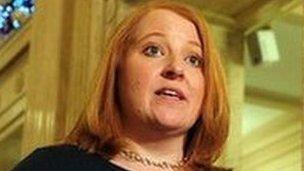Alliance amendment on political donation secrecy
- Published

Naomi Long wants to end secrecy surrounding political donations in Northern Ireland
An Alliance MP is to put forward amendments at Westminster to change the law on the secrecy of political donations in Northern Ireland.
East Belfast MP Naomi Long wants to end the secretary of state's power of veto over publishing the identity of donors.
Currently, donations over £7,500 from a single source to a political party are made public in the rest of the UK.
However, in Northern Ireland the information is not published due to concerns about the security risk.
The information is given to the Electoral Commission.
In March, an all-party House of Commons committee called for the confidentiality around large donations to political parties in Northern Ireland to end.
A report published by the Northern Ireland Affairs select committee said the changes should come into effect by October 2014,
This is provided the security situation does not deteriorate.
Discretion
The Alliance Party already voluntarily publishes its donor list on its website.
Mrs Long's first amendment would ensure that any donation made after 1 January 2014 would be made subject to publication at whatever point the secretary of state removes the block, making the situation clear for the general public and for donors.
The second amendment would remove the secretary of state's discretion to extend the exemption to publication beyond October 2014.
Mrs Long said the amendments would ensure publication of donations would be brought into line with the rest of the UK as soon as possible.
"No-one is denying there is still a risk to security and no-one is dismissing that as an issue," she said.
"If donors know that their information is to be published, then they can make an informed decision as to what the risk might then be and whether or not they wish to donate in light of that."
She said the rules, at the moment were "so opaque" that it was not possible to obtain confirmation from the Electoral Commission of the accuracy of claims made by parties that they had few donors who gave them over £7,000 per year.
"I don't think that is acceptable. The public in Northern Ireland have a right to scrutinise whether parties get their money," Mrs Long said.
"There is nothing wrong with parties receiving money from business or from other individuals who have money to do that but it is up to the public to see that and decide whether or no that then influences what those parties do when they have the opportunity to make a change."
- Published25 March 2013